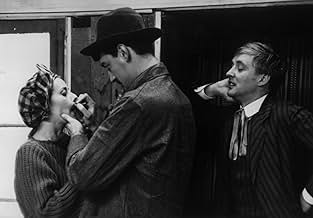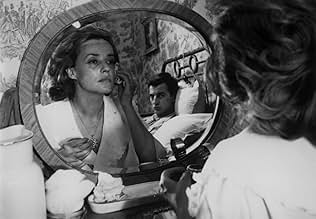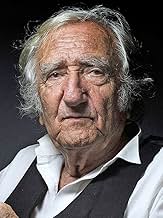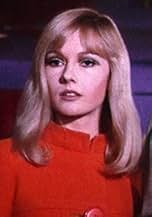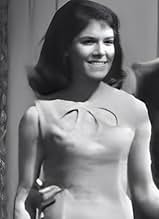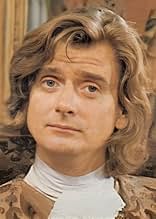IMDb-BEWERTUNG
7,7/10
46.054
IHRE BEWERTUNG
Jahrzehnte einer Dreiecks-Liebesgeschichte über zwei Freunde und eine impulsive Frau.Jahrzehnte einer Dreiecks-Liebesgeschichte über zwei Freunde und eine impulsive Frau.Jahrzehnte einer Dreiecks-Liebesgeschichte über zwei Freunde und eine impulsive Frau.
- Regie
- Drehbuch
- Hauptbesetzung
- Nominiert für 2 BAFTA Awards
- 3 Gewinne & 4 Nominierungen insgesamt
Oskar Werner
- Jules
- (as Oscar Werner)
Serge Rezvani
- Albert
- (as Bassiak)
Michel Subor
- Récitant
- (Synchronisation)
- …
Danielle Bassiak
- Compagnon d'Albert
- (Nicht genannt)
Elen Bober
- Mathilde
- (Nicht genannt)
Pierre Fabre
- Ivrogne in Cafe'
- (Nicht genannt)
Dominique Lacarrière
- Une des femmes
- (Nicht genannt)
Bernard Largemains
- Merlin
- (Nicht genannt)
Kate Noelle
- Birgitta
- (Nicht genannt)
Jean-Louis Richard
- Cliente au Cafe'
- (Nicht genannt)
Michel Varesano
- Cliente au Cafe'
- (Nicht genannt)
Christiane Wagner
- Helga
- (Nicht genannt)
Empfohlene Bewertungen
Two lads from different backgrounds form a bond, a French boy with dark hair, an Austrian blond, quite Bohemian in their ways, taking pleasure all their days, and then Catherine makes it three, and waves her wand. Jim is smitten with this beauty and he falls, but then war breaks out, and homeland duty calls, so they marry, relocate, intense fighting means a break, she has a child, world reconciles, and bonds remake. Jules travels to the home of his two friends, where the triangle rotates, gyrates and bends, now he's coupled with Catherine, but Jim feels no chagrin, though it's clear this isn't where the story ends.
Jeanne Moreau is always outstanding!
Jeanne Moreau is always outstanding!
Jules (Oskar Werner), an introspective Austrian and Jim (Henri Serre) a confident Frenchman begin a friendship that defies understanding. What begins as an exchange and discourse over art develops into a bond that seems able to withstand anything, including fighting against each other in WWI. After the war has ended, the duo goes on sharing art and women with each other, until Jules falls in love with Catherine (Jeanne Moreau), a free-spirited woman with an unpredictable temperament, prone to emotional outbursts. Despite the easy-going inexperienced Jules being an odd fit for Catherine, he asks Jim not to chase Catherine, so he can have her love all to himself. Despite Jules' request, he invites Jim on many of the couple's outings and the trio spends most of their time together. Even after Catherine and Jules marry and have a child, Jim is invited to live in their home with them. Over time, an intimacy begins to develop between Jim and Catherine, which Jules is aware of. Instead of risking losing his friend or his marriage Jules allows the intimacy to blossom which creates a domino effect of emotions between the three of them. Life no longer is about what each wants individually, but rather what each other wants and expects and what kind of life they want the other to fulfill. The decision to allow the three-way relationship has enduring effects on all involved due to the complicated nature of the two men's love for Catherine, as well as their devotion to each other. Bonds will be tested, as Jules and Jim face another war, this time, off the battlefield.
"You said, "I love you," I said, "Wait." I was going to say, "Take me," you said, "Go away." Arguably the most memorable quote from Jules and Jim also acted as a heart-wrenching opening, conveying to the audience just how much of an emotional experience they were in for. As we are introduced to each character, Truffaut takes his deliberate time revealing what Jules and Jim mean to each other. It is Truffaut's prowess as a director that allows the audience to truly understand the depth of devotion that Jules and Jim share for each other. Without his labored efforts, the rest of the story would pass by unnoticed because this truly is a story about three people in love rather than a love triangle with each point seeking out the object of their affection. The story relies on the understanding that neither Jules, Jim, nor Catherine will seek to fulfill their own needs at the expense of each other. Technically, Truffaut showed mastery on only his third feature film. His use of freeze frames was fantastic and essential in allowing the audience to realize the profound effect on the emotional state of the men involved with Catherine, each "moved by a symbol they could not understand." Truffaut also uses the overlay technique a few times to great success, placing Catherine's face over a few scenes really driving home the idea that every thought or activity Jules and Jim ever took part in was driven by Catherine. In just three short years since his first feature, The 400 Blows--a masterpiece in its own right, Truffaut further revealed his mastery for capturing the complexity of human emotion like few others before him.
Few films tackle the emotionally intense themes Jules and Jim take on. Truffaut delves into pain, the kind of pain that is caused by yearning in love. Love and lust is a theme constantly at the forefront of the film, as well, along with a precise distinction between the two. Jules, lacking the romantic experience of Jim, attempts to shield Catherine from Jim for fear that he will only lust after her. When it becomes clear that Jim actually loves Catherine, as Jules does, he relents and decides to share his love of Catherine with Jim. Jules loves Catherine and shares a devotion to Jim, so he supports a union between Jim and Catherine because he needs to be a part of each's life and wants happiness for all parties involved, and vice-versa for Catherine and Jim. Devotion, like I have never since seen replicated on screen, is the driving force behind each character's actions and thoughts. The way Truffaut managed to capture that devoted motivation shows impeccable insight to the human spirit and cements him as the purest most personal filmmaker I have ever seen. Running the gamut of emotional commentary, Truffaut also successfully illustrates loneliness, especially experienced by Catherine, and its power over life. Catherine is clearly a damaged soul, she has met and overcome many obstacles in her life, most of which, are only alluded to. There are aspects of both Jules and Jim that she depends on for her very survival, necessitating that they both remain in her life. Catherine has been unable to commit to another due to her expectation of being abandoned, as only hinted to in a couple of scenes between her and Jules. It is this damage that makes her reckless and prompts Jules and Jim to be more cautious in their interactions with her. To be able to show every unlikeable aspect of a human being, yet, still endear that person in the hearts of the audience was a skill no one in the history of cinema has been more proficient at than Francois Truffaut. By the film's conclusion, we may not have that ending that leaves each better off and happy, but what we do get is the realization that we're all in search of our statue; that one person that is perfect to us and for us despite their obvious flaws, just as Jules and Jim traversed gardens in search of their statues before they happened upon the same one, and once we find that statue, we will do whatever it takes to keep it in our view.
"You said, "I love you," I said, "Wait." I was going to say, "Take me," you said, "Go away." Arguably the most memorable quote from Jules and Jim also acted as a heart-wrenching opening, conveying to the audience just how much of an emotional experience they were in for. As we are introduced to each character, Truffaut takes his deliberate time revealing what Jules and Jim mean to each other. It is Truffaut's prowess as a director that allows the audience to truly understand the depth of devotion that Jules and Jim share for each other. Without his labored efforts, the rest of the story would pass by unnoticed because this truly is a story about three people in love rather than a love triangle with each point seeking out the object of their affection. The story relies on the understanding that neither Jules, Jim, nor Catherine will seek to fulfill their own needs at the expense of each other. Technically, Truffaut showed mastery on only his third feature film. His use of freeze frames was fantastic and essential in allowing the audience to realize the profound effect on the emotional state of the men involved with Catherine, each "moved by a symbol they could not understand." Truffaut also uses the overlay technique a few times to great success, placing Catherine's face over a few scenes really driving home the idea that every thought or activity Jules and Jim ever took part in was driven by Catherine. In just three short years since his first feature, The 400 Blows--a masterpiece in its own right, Truffaut further revealed his mastery for capturing the complexity of human emotion like few others before him.
Few films tackle the emotionally intense themes Jules and Jim take on. Truffaut delves into pain, the kind of pain that is caused by yearning in love. Love and lust is a theme constantly at the forefront of the film, as well, along with a precise distinction between the two. Jules, lacking the romantic experience of Jim, attempts to shield Catherine from Jim for fear that he will only lust after her. When it becomes clear that Jim actually loves Catherine, as Jules does, he relents and decides to share his love of Catherine with Jim. Jules loves Catherine and shares a devotion to Jim, so he supports a union between Jim and Catherine because he needs to be a part of each's life and wants happiness for all parties involved, and vice-versa for Catherine and Jim. Devotion, like I have never since seen replicated on screen, is the driving force behind each character's actions and thoughts. The way Truffaut managed to capture that devoted motivation shows impeccable insight to the human spirit and cements him as the purest most personal filmmaker I have ever seen. Running the gamut of emotional commentary, Truffaut also successfully illustrates loneliness, especially experienced by Catherine, and its power over life. Catherine is clearly a damaged soul, she has met and overcome many obstacles in her life, most of which, are only alluded to. There are aspects of both Jules and Jim that she depends on for her very survival, necessitating that they both remain in her life. Catherine has been unable to commit to another due to her expectation of being abandoned, as only hinted to in a couple of scenes between her and Jules. It is this damage that makes her reckless and prompts Jules and Jim to be more cautious in their interactions with her. To be able to show every unlikeable aspect of a human being, yet, still endear that person in the hearts of the audience was a skill no one in the history of cinema has been more proficient at than Francois Truffaut. By the film's conclusion, we may not have that ending that leaves each better off and happy, but what we do get is the realization that we're all in search of our statue; that one person that is perfect to us and for us despite their obvious flaws, just as Jules and Jim traversed gardens in search of their statues before they happened upon the same one, and once we find that statue, we will do whatever it takes to keep it in our view.
Tonight I finally watched Jules and Jim again for the first time in many years, and it made me angry. I'm not sure why, but there's something about the romanticization of inconstancy that I find disturbing. Jeanne Moreau is, of course, riveting, mostly, and the film is beautifully made. It's just that I can't shake the feeling that what is being portrayed as a great force of nature the essence of Moreau's character as "une vrai femme" -- is really a powerful but unsteady egotism, enormous grace and charm coupled with an inability to conceive of the reality of other people, or at least to share in mutual reality. In its place there is the lightning of desire in an oversimplified context of defiance against hypocrisy. There is something false about the whole business, as if the movie wants to celebrate the (ostensible) freedom of la belle Catherine and to do so it must attribute the human damage she causes to some grand sort of fate, not ordinary consequence, and the failure and the damage is made to seem mysteriously inevitable. Worse yet, by identifying her as an elemental power and attributing this to her absolute femininity, the film is misogynistic. That is, it implies that the ultimate nature of woman is beyond reason, beyond morality.
And yet Truffaut does it all so beautifully that it seems to undercut the negative part, the pain and waste of what happens to people. Still, smiling cruelty is cruelty. Sorry for ranting. I wanted to like the movie, and I did to a large extent, but it bothered me, too.
And yet Truffaut does it all so beautifully that it seems to undercut the negative part, the pain and waste of what happens to people. Still, smiling cruelty is cruelty. Sorry for ranting. I wanted to like the movie, and I did to a large extent, but it bothered me, too.
Whenever a commentator declares outright that a film is a complete waste of time and that nobody, BUT NOBODY, should ever watch it, I tend to peg that commentator as an opinionated ass. So I would never say that about a well-respected film like "Jules and Jim." But quite honestly, I can't warm up to it. I've watched it on more than one occasion over the years, and it never fails to put me to sleep at both ends of my anatomy. I've just viewed a DVD edition in which a film scholar clearly explains his views on the fascination of "Jules and Jim." But I still couldn't see why the relationship of these three tedious characters, discussed and analyzed in all its very tedious minutiae by those same characters and an off-screen narrator (also tedious), should interest me. It's certainly beloved by academic types (maybe for those very same characteristics?), and film critics eat it up like it has gravy on it. Like another commentator, I'm a bit puzzled by all the comments about its lyrical, lighthearted and idyllic qualities. I'm left with the impression of a rather dry, academic dissertation on the complexities of male-female relationships ca. 1961 (the 1910 setting seems to me immaterial to the script).
I can't help feeling that I'm missing something, and I'm not averse to French films, but they're usually older, pre-new-wave films, for example "Forbidden Games," "French Can-Can," or Pagnol's "Fanny" trilogy. I take it that the sentimentality of such films is one of the things new wave directors reacted against. If so, I can't jump on their bandwagon, try as I might. I've enjoyed some of Truffaut's work, but not this, I'm afraid.
To those who love and appreciate "Jules and Jim" -- have pleasure of it. I envy you for that, and maybe I'll try it again in a few years.
I can't help feeling that I'm missing something, and I'm not averse to French films, but they're usually older, pre-new-wave films, for example "Forbidden Games," "French Can-Can," or Pagnol's "Fanny" trilogy. I take it that the sentimentality of such films is one of the things new wave directors reacted against. If so, I can't jump on their bandwagon, try as I might. I've enjoyed some of Truffaut's work, but not this, I'm afraid.
To those who love and appreciate "Jules and Jim" -- have pleasure of it. I envy you for that, and maybe I'll try it again in a few years.
This is the first movie by Truffault I've ever seen, and I have to say I'm now very intrigued in his other work...
"Jules et Jim" is the story of two friends who meet a very beautiful and strange woman who turns up to be a bit unstable...
It starts with how they all meet each other and end up together... I thought the beginning was pretty fast as many things happened and you just wonder if the whole movie will be like that. Also I thought I didn't care much for any character, but of course it was too quick to judge. There is also a narrator (throughout the movie) and at first you ask yourself if its really necessary...
Still, when I decided to go grab a snack, I realized I was so hooked by the story that I couldn't. The characters behaved like no other I've seen and you find yourself wanting two different things: for it to end and for it never to end.
The movie has it's many twists for those who like, even a laugh here and there, but if you see it as a whole is a very deep description of the relationship between the three main characters.
The end is somehow beautiful, maybe because is "fair", maybe because is "real", maybe because is "surreal", you'll just have to watch and find out...
Is one of those movies when after watching it you understand both sides: those who say it's overrated and those who claim it's a masterpiece... to me it was a one in a lifetime film experience
"Jules et Jim" is the story of two friends who meet a very beautiful and strange woman who turns up to be a bit unstable...
It starts with how they all meet each other and end up together... I thought the beginning was pretty fast as many things happened and you just wonder if the whole movie will be like that. Also I thought I didn't care much for any character, but of course it was too quick to judge. There is also a narrator (throughout the movie) and at first you ask yourself if its really necessary...
Still, when I decided to go grab a snack, I realized I was so hooked by the story that I couldn't. The characters behaved like no other I've seen and you find yourself wanting two different things: for it to end and for it never to end.
The movie has it's many twists for those who like, even a laugh here and there, but if you see it as a whole is a very deep description of the relationship between the three main characters.
The end is somehow beautiful, maybe because is "fair", maybe because is "real", maybe because is "surreal", you'll just have to watch and find out...
Is one of those movies when after watching it you understand both sides: those who say it's overrated and those who claim it's a masterpiece... to me it was a one in a lifetime film experience
Wusstest du schon
- WissenswertesHenri-Pierre Roché's original novel was based on his own experiences as a young man. The original Catherine was still alive when the film was released and even attended the premiere incognito.
- PatzerWhen Catherine lights the letters on fire, they are at first away from her dress, but in the next shot they are burning on top of her dress.
- Alternative VersionenThe Criterion Region 1 disc and the Tartan Region 2 DVD have a scene in which the film is reversed left/right. When Jules, Jim, and Albert are sitting on the grass sharing stories about the war, the order of the three characters repeatedly changes between shots. This does not occur in other DVD releases of this film, including the Fox/Lorber Region 1 release.
- VerbindungenEdited into Laggiù qualcuno mi ama (2023)
Top-Auswahl
Melde dich zum Bewerten an und greife auf die Watchlist für personalisierte Empfehlungen zu.
- How long is Jules and Jim?Powered by Alexa
Details
- Erscheinungsdatum
- Herkunftsland
- Sprachen
- Auch bekannt als
- Jules and Jim
- Drehorte
- Produktionsfirmen
- Weitere beteiligte Unternehmen bei IMDbPro anzeigen
Box Office
- Bruttoertrag in den USA und Kanada
- 509 $
- Eröffnungswochenende in den USA und in Kanada
- 11.206 $
- 25. Apr. 1999
- Weltweiter Bruttoertrag
- 496.383 $
- Laufzeit1 Stunde 45 Minuten
- Farbe
- Sound-Mix
- Seitenverhältnis
- 2.35 : 1
Zu dieser Seite beitragen
Bearbeitung vorschlagen oder fehlenden Inhalt hinzufügen


![Bande-annonce [OV] ansehen](https://m.media-amazon.com/images/M/MV5BMWM5OGI0MjUtZDRhMC00ZGQ1LTk0NWEtMWMzZDFhMjA1OTk1XkEyXkFqcGdeQXRodW1ibmFpbC1pbml0aWFsaXplcg@@._V1_QL75_UX500_CR0)
